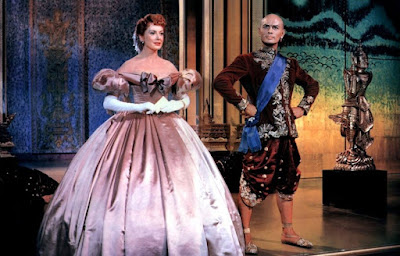[Back in 2018, there was a social media challenge on Facebook in which a person posted a picture a day for 10 days of 10 films that made an impact on them. However, I went a step beyond and posted an explanation as to why they made that impact. For the sake of posterity, they're being reposted here in their entirety (with some modification/update where warranted)]:
Day 10 of 10 movies that had an impact on me. 10 films that inspired you, 10 days, one image. I was nominated for this challenge by Andrew Baldwin. Y’know what? Fuck it! I challenge all the moderators of FanFreeks.
Others might think differently, but in my estimation Rodgers & Hammerstein shot the proverbial wad with this one; both a helluva production and a helluva film. Yet some assert it would be problematic to produce as it was originally presented so many decades ago. After all, The King of Siam (Yul Brynner), its male lead, was chauvinistic, self-centered, entitled, and stubborn, while the women were presented subserviently.
But in my opinion, those critics miss the point. Mistress Anna (the beguiling Deborah Kerr), the female lead, was anything BUT subservient. Her own person with a strong sense of self, wit, and poise, she was the "very difficult woman" who was progressive in a way that challenged everything the King held dear. The story is more than an (almost) chaste love story between two people of different worlds; it’s also a story of inexorably encroaching progress, and of the pains of generational transition when the old must give way to the new.
In the hands of any other actor, the King would have been insufferable. But no one…absolutely no one…could have ever been more suited to the role than Yul Brynner (it had once been a dream of mine to someday play the role but the closest I ever got was to subtly homage it during living chess games at Vizcaya in 2001). When one discusses charismatic, magnetic performances, his is textbook example. Yet if you pay close attention, the twinkle in his eye and the subtle smirk belies any seriousness his character takes himself. More often than not, he is a brat; a man who balances his responsibility to his people and culture with Pimp Daddy energy. There are moments wherein he’s a mischievous boy in a man’s body; one that’s fearful of this new world and way of life that's encroaching on his beloved nation. He epitomizes a way of life that arguably can no longer survive but instead of embracing change in the form of the beguiling and steely Kerr-as-Anna he rebukes it, sending her away. By not embracing that love…and by extension that way of life…he withers and dies, but not before recognizing and instructing the next generation in the form of his son, to embrace the new ways while remembering the old, for only in that understanding that true progress and prosperity can result. Brynner pulled it off in spectacular fashion, his performance was so beloved he played the role for years even after his initial Broadway run and this performance…a total of 4,625 times on stage (even under excruciating physical duress). It bears mentioning that at the end of the iconic musical number, Brynner and Kerr engage in a primal, erotically passionate stare down that surpasses almost anything else of its kind ever in celluloid, all without word or touch.
The image above exemplifies the film completely. Two people of differing perspectives, each imperious and strong in their own way, but standing together as equals, all smiles (subtle though they be), basking in each other’s presence despite themselves, yet each too stubborn to acknowledge that, despite their differences, they’re stronger together.
In my opinion, there’s never been a greater love story put to film.


967D8CB5DC
ReplyDeletekiralık hacker
hacker arıyorum
kiralık hacker
hacker arıyorum
belek
06D951629B
ReplyDeletePrinting enthusiasts often seek high-quality solutions for their designs, and best dtf transfers are gaining popularity for their vibrant results. These transfers offer a durable and professional finish, making them ideal for various fabric types. Many users recommend exploring different options to find the perfect fit for their needs. For those interested, visiting the site can provide valuable insights into the latest advancements in DTF technology.